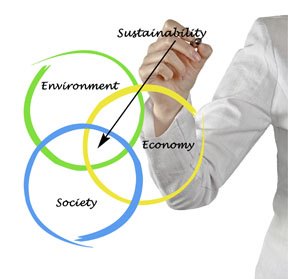By Molly Kerby, Gayle Mallinger
Abstract
 Over the last few decades, the notion of sustainability has become an interdisciplinary buzz word. Sustainability has been an integrative concept that includes three constructs or pillars: a) social; b) economic; and c) ecological. Until recently, theoretical approaches based on the three pillars approach have operated in silos rather than exploring the interconnectedness of the constructs. Few models have moved beyond the idea that logical relations exist among the constructs (social, economic, and ecological) to consider factors external to communities, nor have they examined the internal socio-economic factors that influence positive outcomes. While this conceptualization has raised awareness about the distribution of scarce resources, it has not been useful in creating resilient and sustainable development. The model proposed in this paper is theoretically driven and considers the multifaceted concepts of ecological perspectives and risk and resilience. In addition, unlike previous conceptual representations, the model suggested in this paper offers opportunities for intervention to decrease risk, promote community cohesion, and encourage social change through empirical investigation.
Over the last few decades, the notion of sustainability has become an interdisciplinary buzz word. Sustainability has been an integrative concept that includes three constructs or pillars: a) social; b) economic; and c) ecological. Until recently, theoretical approaches based on the three pillars approach have operated in silos rather than exploring the interconnectedness of the constructs. Few models have moved beyond the idea that logical relations exist among the constructs (social, economic, and ecological) to consider factors external to communities, nor have they examined the internal socio-economic factors that influence positive outcomes. While this conceptualization has raised awareness about the distribution of scarce resources, it has not been useful in creating resilient and sustainable development. The model proposed in this paper is theoretically driven and considers the multifaceted concepts of ecological perspectives and risk and resilience. In addition, unlike previous conceptual representations, the model suggested in this paper offers opportunities for intervention to decrease risk, promote community cohesion, and encourage social change through empirical investigation.

